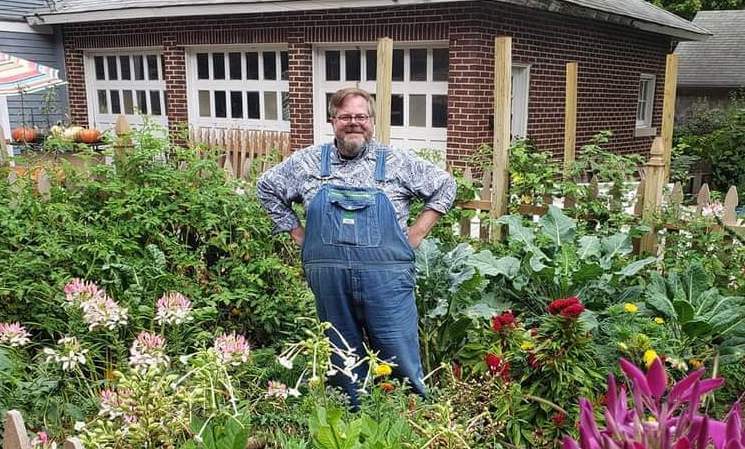
Go to just about any community event in Black Hawk County and it seems like County Supervisor Chris Schwartz is there—and not because he’s running for re-election (which he is) or looking for media attention. Quite the opposite, actually. Schwartz seems oblivious to media presence.
“If you want the public to trust you and your leadership to serve them and to work with them, you’ve got to show up,” said Schwartz. “And you can’t fake showing up. You can’t fake integrity.”
Schwartz has applied his leadership and commitment to “showing up” to his job as county supervisor since he was elected in 2016, as evidenced by the number of initiatives he’s led.
Schwartz was instrumental in the Tyson shut down following the COVID-19 outbreak. Weeks before, he’d been hearing from clinics that Tyson employees were showing up and testing positive for the coronavirus. Additionally, he was receiving updates in daily emergency operations meetings and hearing from Dr. Nafissa Egbuonye, Director of the Black Hawk County Health Department, and Sheriff Tony Thompson that a large outbreak was underway. Schwartz began working behind the scenes, communicating with Tyson and asking them to close, then contacting Governor Reynolds to demand it.
“In the emergency operations center,” said Schwartz, “I was given the task of organizing a coalition of local elected officials that would come out and collectively call to Tyson to close and test all their employees.”
He organized twenty-some local mayors, county officials, city council members, and legislators, and then presented the letter they helped draft at the press conference. This, followed by national media appearances by Schwartz, Mayor Hart, Sheriff Thompson, and local leaders helped shine the national spotlight on Tyson and generated public pressure that resulted in Tyson’s temporary closing and testing of employees in April.
Schwartz also serves on the founding committee of the Waterloo Warming Center. This past winter, he worked with Rev. Abraham Funchess to open up an emergency warming center for the homeless.
“There’s a shortage of beds in this community,” said Schwartz. “There’s also limited options for people that are actively dealing with addiction or alcoholism. So this warming center is a low barrier shelter that accepts anyone in need of a place to be and be safe in Waterloo for the night, whether they are currently dealing with addiction issues or not.”
The center offers more than a bed—when people check out, they’re given a referral for a housing specialist and drug addiction/mental health help, if needed. The center remained open until the end of May and, with their emergency operations and quarantine plan in place, they were able to get through the pandemic without an outbreak.
Schwartz stated they’re close to announcing the opening dates for this season.
He’s also worked on infrastructure projects. He worked with Black Hawk County Conservation Board and others to repair the Black Hawk County side of the Cedar Valley Nature Trail, which now connects to the American Discovery Trail which allows outdoor enthusiasts to hike, bike, or ride horseback from Cape Henlopen State Park in Delaware to Pt. Reyes National Seashore in California.
Other infrastructure projects include the new $4 million Cedar Wapsi Road Bridge, currently underway, and experimentation with new drainage techniques in hopes of preventing frost boils from turning the county’s gravel roads to impassible mud pits due to the freezing and thawing of water that collects on the roads during winter.
Then there’s the county solar project.
Seven county buildings will be made completely solar, including a large old historic hospital that houses a number of county offices including the public health and veteran affairs and DHS offices. Schwartz believes this may be the largest historic building in the state that’s completely solar.
“I can’t remember the carbon offset right now but it’s the equivalent of about 400,000 trees and a tax savings of $1.5 million dollars over the 25 year warranty period of the panels. The panels have a 40-year life span so closer to $3 million of tax dollars saved over the life of panels by the offset energy use.”
Schwartz wants to work on more social justice issues, such as the addition of a social worker to help people who were in the jail system to transition to life outside, more pre-arrest programs to prevent people from entering the system, and making the Fair Chance Initiative, which was implemented in Waterloo this year, county-wide. Schwartz has also participated in the regularly scheduled peace walks in Waterloo and his campaign initiated a Black Lives Matter yard sign push, which encompassed more than 10 events and enabled people to get signs from him or his website.
Schwartz’s interest in social justice began when he was in 6th grade. In 1991, Dubuque (where he was born and raised) had been terrorized by 10 to 13 cross burnings throughout the late summer and fall months and the Ku Klux Klan had marched in the city.
“One of these cross burnings happened just a block away from my home. My teacher, Sister Mary Lee Cox, who is still active in social justice stuff in her retirement, organized a peace vigil at this home, saying this wasn’t going to be tolerated in our neighborhood.”
His mom took him and his three siblings down to it and it made the NBC national news that night. After that, his mother had them volunteering and stuffing envelopes for the NAACP chapter in Dubuque.
“That’s when I say I got hooked on social justice.”
Schwartz would go on to volunteer for the 2000 election, add political science to his Jazz Studies and Music Education major at UNI, start an ACLU chapter on campus, become involved in the anti-war in Iraq movement, and help found the campus anti-war network, which fed into chapters on 60 campuses across the country. Upon graduation from UNI, he was hired by Americans for Democratic Action and still organizes with them today.
Schwartz’s path to county supervisor hasn’t been easy.
“It was definitely rough—it was hard getting here, for sure.”
Schwartz, who is gay, and his fiancé, Logun Buckley, were targets of anti-gay hate crimes during his run for office in 2016. Schwartz believes there are only 7 to 8 out gay elected officials in Iowa and he may be the first gay man elected to county office in the state.

“There are certainly people that hate our guts because we are proud LGBTQ people who will stand up for anybody that needs a voice, that needs a friend. But by and large, the community recognizes that and respects it and we feel really pretty loved here.”
And Schwartz loves his community.
Even before he was elected (and before the pandemic), Schwartz and Buckley were known for hosting parties. They’ve hosted parties for 20-25 different Democrat candidates running for governor, U.S. senate, president, and local races, such as city council and state house.

“We love to entertain. We are very lucky to own this beautiful historic home. And we love sharing that with the community and welcoming the community into our home to build progressive politics, as well a support great nonprofits that we do fundraising for.”
Why should he be re-elected to county supervisor?
“I’m a leader who helps make progress happen,” said Schwartz. “I lead with integrity—that means I’m honest, I’m accessible, and I show up. And so with me, they know they’re always going to have an empathetic advocate on their side.”
by Rachelle Chase
Posted 10/25/20
Iowa Starting Line is an independently owned progressive news outlet devoted to providing unique, insightful coverage on Iowa news and politics. We need reader support to continue operating — please donate here. Follow us on Twitter and Facebook for more coverage.
